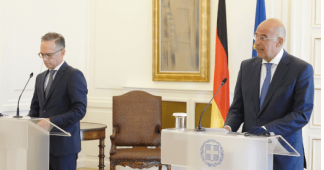September 12, 2020
Under the mediation of Germany, diplomatic representatives from Greece and Turkey met last month in Berlin to start a process that would lead the two countries to the negotiation table and de-escalate tension in the Eastern Mediterranean Sea. The meetings were kept secret, participants were a diplomatic advisor to Prime Minister Kyriakos Mitsotakis, one of President Tayyip Erdogan and the German mediator.
The process initiated by Germany provided for a “written commitment” (memorandum of understanding) by both sides to the German mediator in which they would articulate a series of moves to demonstrate their goodwill to reach a settlement at the negotiating table. This intention of the two sides would be solemnly expressed in a joint statement which would mark the beginning of the talks.
However, Turkey withdrew from the talks when Greece signed the maritime boundaries agreement with Egypt on August 6. The Turkish Foreign Minister went public and revealed the whole process.
In an exclusive story, Greek weekly newspaper To Pontiki revealed the content of the “written commitment”
Turkey reportedly was committed to:
- Stop hydrocarbon surveys and exploration in the eastern Mediterranean
- Stop the rhetorical and practical disputes over the sovereignty of rocky islands and islets
On its part, Greece undertook the obligations:
- To stop the licensing procedures of surveys in sea plots south of Crete (of interest to the French TOTAL)
- To proceed with the partial demilitarization of some islands
- Not to change the existing status in the area with the expansion of its territorial waters
Finally, both sides pledged to avoid unilateral moves that could undermine confidence and undermine the dialogue process.
According to Pontiki information, the Greek Ministry of Foreign Affairs learned about these secret processes from the Turkish Minister of Foreign Affairs, who revealed them publicly. “It is also worth noting that the agreement with Egypt on the EEZ arose as a result of intense behind-the-scenes activity of the Americans who worked closely with the Greek Foreign Ministry,” the newspaper stressed.
Worth recalling that while one of the secret meetings was to take place in Berlin, the Greek Foreign Minister Nikos Dendias rushed to Cairo to sign the maritime boundaries agreement with Egypt.
“Ultimately, the Americans undermined the German initiative, Berlin got sour on Greece, Turkey withdrew from the secret meetings and there was also the absolute rupture of relations between Mitsotakis and Dendias,” To Pontiki summarizes. It adds that that was the point where Greek-French ties revived.
The Greek-Turkish issue was again in the hand of the US that transferred (again) the initiative for the handling of the issue to the NATO, where the discussion for Confidence Building Measures was suppose dot be held in order to avoid any kind of “accident.”
“It is understood that until the written commitment is made public, any refutation are of minimal importance,” notes ToPontiki in its exclusive report.











